Don't miss our holiday offer - up to 50% OFF!
NiVamo 40 Mg (Nivolumab)
NiVamo 40 (40 mg/4 mL vial) is a formulation of nivolumab, a fully human IgG4 monoclonal antibody that acts as an immune-checkpoint inhibitor. In Bangladesh, it is manufactured by Ziska Pharmaceuticals Ltd. under the brand name NiVamo. The drug works by inhibiting the programmed death-1 (PD-1) receptor on T-cells. Tumours often exploit the PD-1/PD-L1 or PD-L2 pathway to evade immune destruction; by blocking PD-1, nivolumab “releases the brakes” on T-cells and permits them to mount a stronger anti-tumour response.
Indications
NiVamo, or nivolumab, is indicated for various malignancies, which include but are not limited to the following:
Unresectable or metastatic melanoma, as monotherapy or in combination with another checkpoint inhibitor such as ipilimumab.
NSCLC in different settings, such as first-line treatment in patients with PD-L1 expression and without EGFR/ALK aberrations, or after platinum-based chemotherapy.
Malignant pleural mesothelioma (first-line in combination).
Advanced renal cell carcinoma (RCC) including first-line or after anti-angiogenic therapy.
Classical Hodgkin lymphoma (relapsed/refractory).
Recurrent/metastatic squamous cell carcinoma of head and neck (SCCHN) after platinum-therapy.
Urothelial carcinoma (locally advanced/metastatic) following prior treatment with platinum-based chemotherapy.
Microsatellite instability-high or mismatch repair deficient metastatic colorectal cancer (in adult and paediatric patients)
Hepatocellular carcinoma (HCC), advanced/unresectable settings. In Bangladesh, the product information indicates a similar spectrum of indications for “Nivamo 40 mg/4 ml”.
Dosage & Administration
NiVamo is given by intravenous infusion. The concentration in the 40 mg vial format is 10 mg/mL (40 mg in 4 mL).
Typical dosing schedules (depending on indication) include: 240 mg every 2 weeks or 480 mg every 4 weeks for many indications.
Combination Therapies In combination therapies, for example, with ipilimumab, specific regimens such as 1 mg/kg nivolumab with 3 mg/kg ipilimumab every 3 weeks for 4 doses followed by maintenance
For pediatric or weight-based dosing (e.g., <40 kg in MSI-H colorectal cancer) 3 mg/kg every 2 weeks is utilized.
Infusion is typically over ~30 minutes. The product should be diluted (e.g. in 0.9% sodium chloride or 5% dextrose) to a final concentration between 1 mg/mL and 10 mg/mL, and not exceed a total volume of ~160 mL. The vial solution must be inspected for particulate matter or discoloration, and the vial should not be shaken.
Mechanism of Action & Pharmacology
As stated, nivolumab binds to PD-1 receptors on T-cells, blocking their interaction with PD-L1/PD-L2 ligands. This blockade restores T-cell proliferation, cytokine production, and anti-tumour activity in the tumour micro-environment.
Pharmacokinetic characteristics include: a terminal half-life of approximately 25-26.7 days, linear kinetics, a volume of distribution of approximately 6.8 L during steady state, and clearance not appreciably affected by age, gender, race, mild hepatic/renal impairment.
Important Precautions & Warnings
As nivolumab increases the activity of the immune system, its use is associated with a risk of immune-related adverse events affecting various organ systems:
Colitis, hepatitis, endocrinopathies (thyroiditis, hypophysitis, adrenal insufficiency), pneumonitis, nephritis, dermatologic reactions.
Infusion-related reactions: In the event of a mild or moderate reaction, infusion rate may be slowed or interrupted; permanent discontinuation may be necessary in the event of a severe reaction.
Use in patients undergoing allogeneic hematopoietic stem cell transplantation carries the risk of severe/fatal complications.
Embryo-fetal toxicity: use in pregnant women may cause harm to the fetus; effective contraception is recommended for females of reproductive potential.
Side Effects
The most common adverse reactions reported are fatigue, rash, pruritus, diarrhea, nausea, decreased appetite, cough, shortness of breath, constipation, vomiting, musculoskeletal pain, headache, and abdominal pain.
Less common but serious adverse events include the immune-related toxicities listed above. Early detection and management, often with corticosteroids or immunosuppressive therapy, are crucial.
Storage & Administration
Visually inspect the vial: Solution should be clear to opalescent; colorless to pale yellow. Discard vials that contain cloudiness or particulate matter.
Solutions for infusion should be used promptly after dilution, and in any case, not beyond ~8 hours from dilution when stored at room temperature.
The product contains no preservatives
The infusion should be given through a sterile, non-pyrogenic, low protein-binding in-line filter. It must not be mixed or co-administered with other drugs in the same intravenous line.
NiVamo 40 mg/4 mL by Ziska Pharmaceuticals is available and listed in local product directories. The local prescribing information is in line with international norms for nivolumab; dosing, indication, and monitoring should, however, always follow the oncologist’s plan in concert with local regulatory guidelines. NiVamo 40 is a powerful treatment modality in immunotherapy for a variety of advanced cancers, working through the restitution of T-cell anti-tumour activity. It has to be administered under specialist supervision, with strict monitoring for its immune-related side-effects and according to special infusion/administration protocols. Its benefits of extending survival and improving outcomes in multiple malignancies have made nivolumab a landmark agent in oncology.


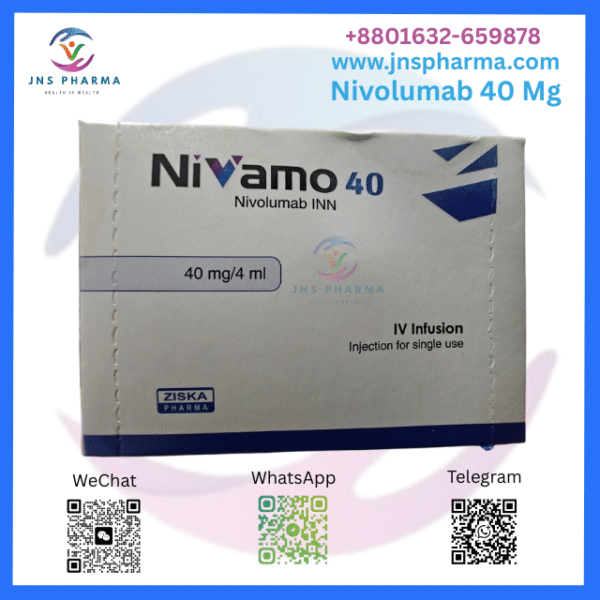
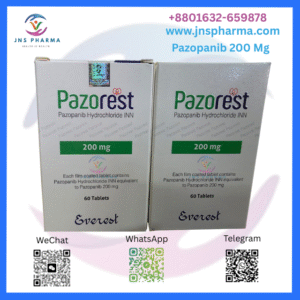
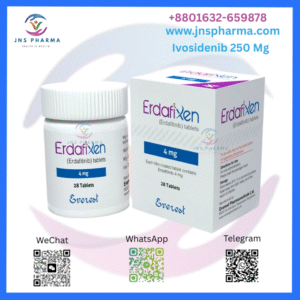
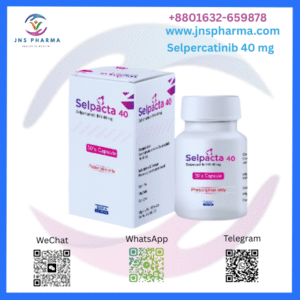
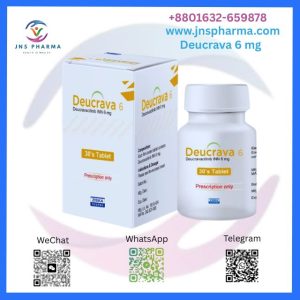
Reviews
There are no reviews yet.